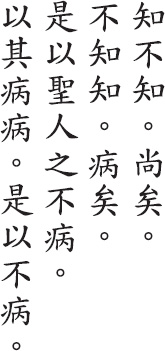71
 |
To understand yet not understand is transcendence not to understand yet understand is affliction the reason sages aren’t afflicted is because they treat affliction as affliction hence they aren’t afflicted |
CONFUCIUS says, “Shall I teach you about understanding? To treat understanding as understanding and to treat not-understanding as not-understanding, this is understanding” (Lunyu: 2.17).
TE-CH’ING says, “The ancients said that the word understanding was the door to all mysteries as well as the door to all misfortune. If you realize that you don’t understand, you eliminate false understanding. This is the door to all mysteries. If you cling to understanding while trying to discover what you don’t understand, you increase the obstacles to understanding. This is the door to all misfortune.”
WU CH’ENG says, “Those who understand yet seem not to understand are the wisest of people. They protect their understanding with stupidity. Those who don’t understand yet think they understand are, in fact, the stupidest of people. They think blind eyes see and deaf ears hear. This is what is meant by ‘affliction.’”
TS’AO TAO-CH’UNG says, “If people understand, but out of humility they say they don’t, then reality is superior to name. Hence, we call it transcendence. If people don’t understand but say they do, then name surpasses reality. Hence, we call this affliction. Those who are able to understand that affliction is affliction are never afflicted.”
SU CH’E says, “The Tao is not something that can be reached through reasoning. Hence, it cannot be understood. Those who do not yet understand do not understand that there is no entrance. And if they do understand, and then they think about their understanding, they become afflicted by understanding.”
CHIAO HUNG says, “Anything that is understood is a delusion. Anything that is a delusion is an affliction. Understanding is not the affliction. It is the understanding of understanding that becomes the affliction. To understand what is the affliction is to cure the illness without medicine.”
LI HSI-CHAI says, “Understanding depends on things. Hence, it involves fabrication. Not understanding returns to the origin. Hence, it approaches the truth. Those who can understand that not understanding approaches the truth and that understanding involves fabrication are transcendent. If they don’t understand that understanding involves fabrication and vainly increase their understanding, they use the affliction as the medicine. Only by understanding that understanding is affliction can one be free of affliction. This is why sages are not afflicted.”
HO-SHANG KUNG says, “To understand the Tao yet to say that we don’t is the transcendence of virtue. Not to understand the Tao and to say that we do is the affliction of virtue. Lesser people don’t understand the meaning of the Tao and vainly act according to their forced understanding and thereby harm their spirit and shorten their years. Sages don’t suffer the affliction of forced understanding because they are pained by the affliction of others.”
Thus do Zen masters ask their students to show them their original face, their face before they were born. The Fuyi and Wangpi editions include two additional lines between lines four and five: “To treat affliction as affliction / is to be unafflicted.” But this would make the last lines more redundant than they already are. Neither line is included by Han Fei or found in the Mawangtui texts, the Chinglung edition, and at least two of our Tunhuang copies. Hence, I have not included them. This verse is not present in the Kuotien texts.